
A tattoo artist creates a stencil of the tattoo design before he takes a needle to the skin. The artist draws the stencil with a special ink that transfers to the skin. This provides an outline of the tattoo design, which allows the artist to work quickly and accurately. Although creating a tattoo stencil is not a complex process, it takes quite a bit of practice to get it right.
Materials
Very few materials are needed to make a tattoo stencil by hand. You will need a sheet of tracing paper, a fine-tipped marker, a dip pen and stencil fluid. Stencil fluid is a dye that transfers to the skin, but is not permanent. You can also purchase pens that are already filled with the stencil fluid, which eliminates the need to frequently dip the pen in a vial of dye.
Simplification
The artist will often simplify the design before making the tattoo stencil. This is particularly true if she is working from someone else's drawing or from a photograph. Simplification means reducing the design to a line drawing that is compatible with tattooing techniques. The artist may eliminate or simplify fine details to avoid a jumbled, "muddy" appearance in the finished tattoo, since tattoo lines are not as fine as pencil lines.
Tracing
The artist then traces the simplified design onto the tracing paper. The simplest method of doing this is to place a sheet of tracing paper over the simplified drawing and trace the lines with a fine tipped marker. The artist typically tapes both the line drawing and the tracing paper to a smooth work surface before tracing to prevent slipping, which can cause inaccuracies.
Reversal
The design must be reversed because the stencil transfers backwards when it is placed on the skin. This is easily accomplished by turning the first sheet of tracing paper over and placing a blank sheet of tracing paper on top. The artist then tapes down both sheets and traces the design with a stencil pen or stencil fluid and a dip pen.
Transfer
The tattoo artist prepares the skin by first cleansing it with green soap (a mild antibacterial cleanser) and a sterile application pad and then by shaving the tattoo area with a fresh disposable razor. She then applies stencil lotion with a sterile pad and places the stencil on the skin with the stencil fluid side facing the skin. The tattoo artist then slowly peels off the tracing paper, leaving the stencil image on the skin.
Related Articles
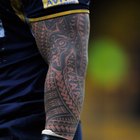
How to Keep Your Tribal Tattoo Black
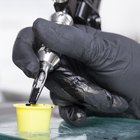
What Is Tattoo Green Soap?
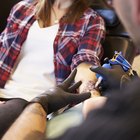
The Advantages of Rotary Tattoo Machines
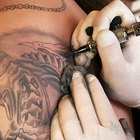
Permanent Tattoo Stencil Transfer Tips

How to Remove Henna Tattoos Quickly
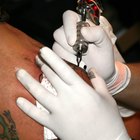
How to Clean Tattoos With Rubbing ...

TCA Tattoo Removal Tips

Why Does Ink Come Out of a Tattoo?

How to Remove an Eyebrow Tattoo
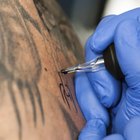
How to Care for an India Ink Tattoo

How to Take Care of a Colored Tattoo ...

What Is the Difference Between Tattoo ...

How to Fix Screen Printing Mistakes

Pros & Cons of Tattoos

Things That Fade Tattoo Ink

How to Fade a Tattoo at Home
Is it Safe to Get Tattoos While ...
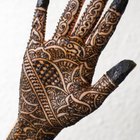
How to Darken a Henna Tattoo

How Are Temporary Tattoos Done?
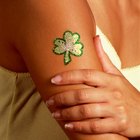
Differences Between a Tattoo & a ...
References
- "The Craft of Tattooing"; Erick Alayon; 2007
Writer Bio
Owen Pearson is a freelance writer who began writing professionally in 2001, focusing on nutritional and health topics. After selling abstract art online for five years, Pearson published a nonfiction book detailing the process of building a successful online art business. Pearson obtained a bachelor's degree in art from the University of Rio Grande in 1997.
Photo Credits
tattoo image by shime from Fotolia.com